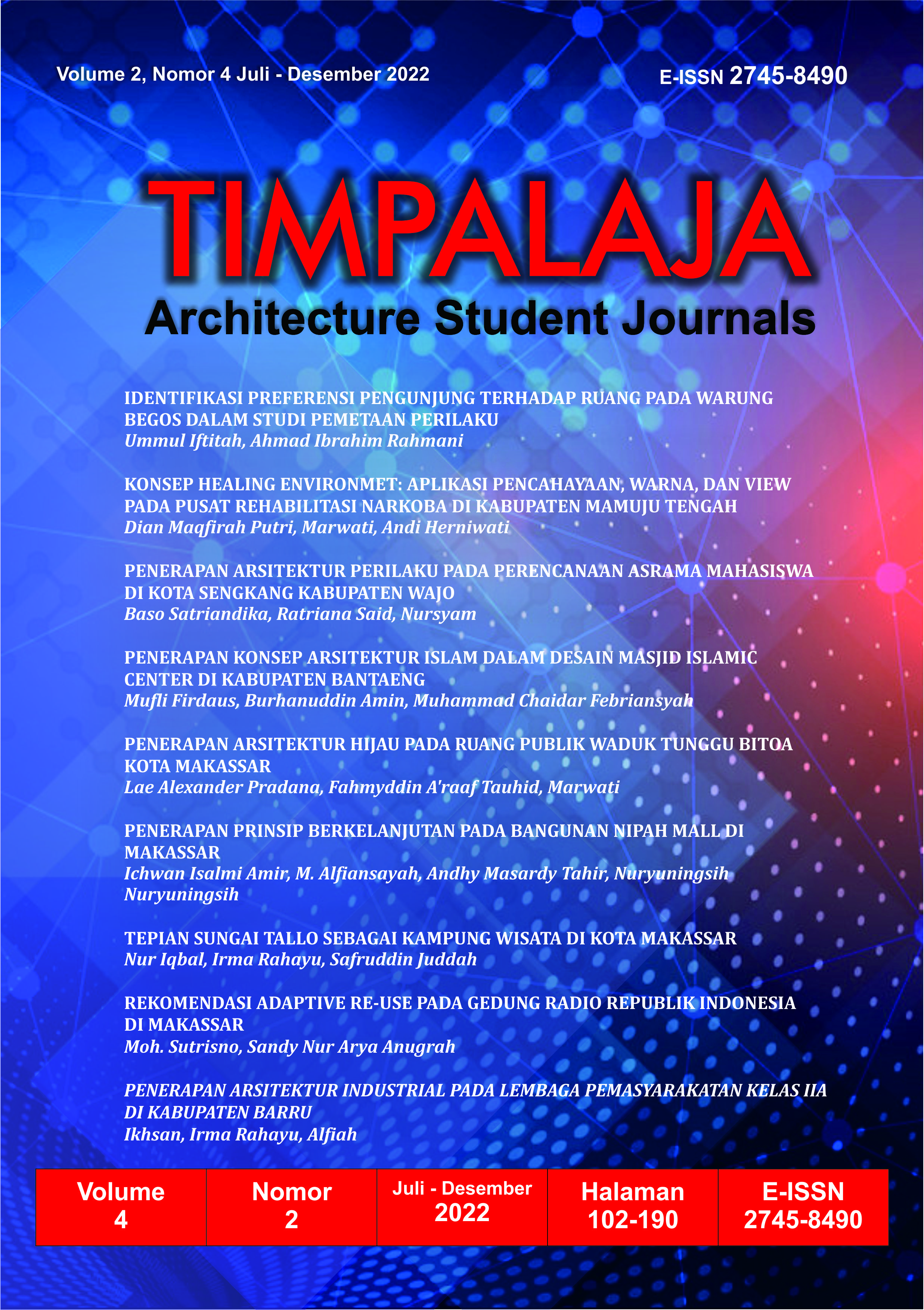Perencanaan Pangkalan Pendaratan Ikan (PPI) Di Pelabuhan Majene Dengan Menerapkan Konsep Biophilic Design
Abstract
The development of the fishing industry in Majene Regency, such as the increasing number of fishermen, the increasing number of Rumah Tangga Perikanan (RTP) catch, and the increase in fishery production are not proportional to the condition of the existing port facilities. The facilities at Majene Port are not utilized due to the damaged condition of the facilities and the poor arrangement of the area. This study aims to plan and design a Pangkalan Pendaratan Ikan (PPI) in Majene Port by applying the concept of Biophilic Design. The research method used is primary data collection by means of field surveys/observations and interviews, secondary data collection is carried out by collecting data on literature studies, journals or scientific works related to titles, books, reading materials related to titles, and other literature. Rxploratory data collection in the form of the results of primary data analysis and secondary data. The planning of the Pangkalan Pendaratan Ikan (PPI) at Majene Port is expected to empower fishermen and fishmonger, from providing more adequate fish landing base facilities and good area arrangement by using the biophilic concept to remove the community's bad perspective about the unpleasant odor at the fish landing base.
References
Adisaputra, W., Pratama, N., & Nawawi, J. (2014). Pengelolaan Retribusi Sektor Kelautan dan Perikanan Terhadap Peningkatan Pendapatan Asli Daerah ( PAD ) di Kabupaten Majene. Jurnal Ilmu Pemerintah, 7(2), 121–128.
Azkiawati, D., & Lissimia, F. (2020). Kajian Konsep Biophilic Pada Bangunan Hunian Vertikal. Jurnal Arsitektur ZONASI, 3(2), 202–210. https://doi.org/10.17509/jaz.v3i2.24448
Justice, R. (2021). Konsep Biophilic Dalam Perancangan Arsitektur. Jurnal Arsitektur ARCADE, 5(1), 110–119.
Karima, M., Firzal, Y., & Faisal, G. (2020). Penerapan Prinsip Desain Arsitektur Biofilik pada Riau Mitigation and Disaster Management Center. ARTEKS : Jurnal Teknik Arsitektur, 5(2), 307–316. https://doi.org/10.30822/arteks.v5i2.448
Purnawarman, A. A. M. (2020). Penerapan Arsitektur Biofilik pada Taman Wisata Botani di Kota Bandung. Repository Tugas Akhir Arsitektur, III(1), 1–10.
Rizal, M. (2018). Elemen Kunci Pengelolaan Optimal Pangkalan Pendaratan Ikan Di Barsela Aceh Berbasis Interpretative Structural Modeling ( Ism ). Prosiding Seminar Nasional Pertanian Dan Perikanan, 1, 286–303.
Rizal, M., Ernani, L., & Muninggar, R. (2019). Model Pengelolaan Optimal Pangkalan Pendaratan Ikan Meulaboh Aceh Barat Berbasis Interpretative Structural Modeling (ISM). Journal of Aceh Aquatic Science, III, 58–75.
Ruswanty, R., Dangnga, M. S., & Halimah, A. S. (2019). Pengaruh Tenaga Kerja, Modal, dan Jarak Tempuh Melaut Terhadap Pendapatan Nelayan di Kelurahan Pangali-Ali Kecamatan Banggae Kabupaten Majene. Jurnal Pendidikan Teknologi Pertanian, 5, 83. https://doi.org/10.26858/jptp.v5i0.8562
Saidi, A. W., Nityasa, N. N., & Tobramangguna. (2021). Revitalisasi Pasar Tradisional Seketeng Sumbawa dengan Pendekatan Arsitektur Biofilik. Jurnal Teknik Gradien, 14(02), 71–83. http://www.ojs.unr.ac.id/index.php/teknikgradien/article/view/762
Tasunar, N. (2006). Kualitas Pelayanan sebagai Strategi Menciptakan Kepuasan pada Pangkalan Pendaratan Ikan (PPI) Moro Demak. Jurnal Sains Pemasaran Indonesia, 5(1), 41–62. https://ejournal.undip.ac.id/index.php/jspi/article/view/14007/10601
Copyright (c) 2022 Irham Tajuddin, Zulkarnain AS, Alfiah Alfiah

This work is licensed under a Creative Commons Attribution-ShareAlike 4.0 International License.
By submitting your manuscript to our journal, you are following Copyright and License







